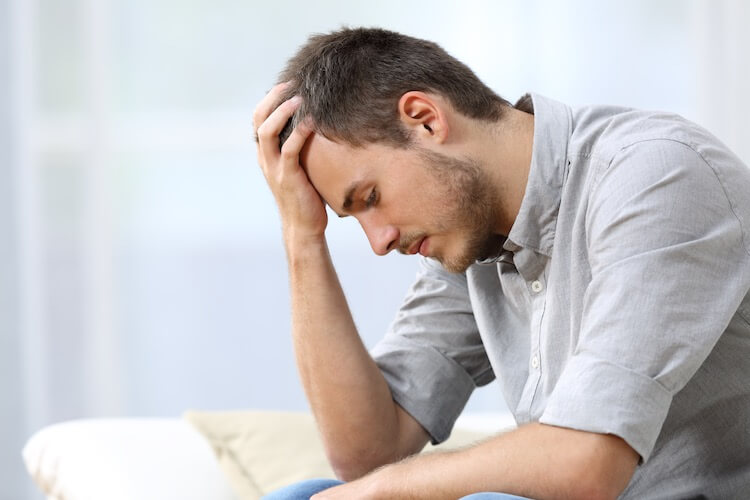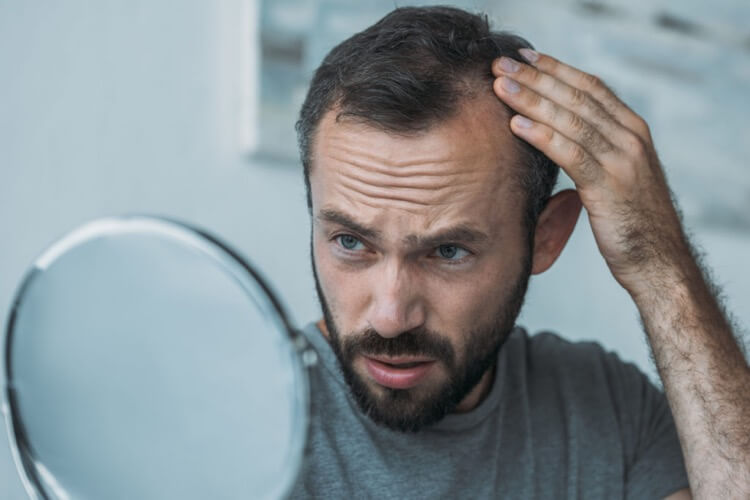The Impact of Hair Loss on Mental Health

“My hair is my everything. When I started seeing it get thinner, it destroyed me. I was really nervous about taking Finasteride orally. Happy Head’s topical solution gave me my confidence back!” – Jordan
Why is losing your hair so tough psychologically? Guys aren’t supposed to care about their looks. But, the truth is that we care about our appearances just as much as women do. Not that we would ever admit it. Here’s proof, though. A survey conducted by Men’s Health magazine found that 70 percent of men believe that their physical appearance affects their overall happiness and well-being. When we look good, we feel good. When our hairline starts to look like Grandad’s, well, we stress.
If you’ve spent more than 30 minutes trying to distinguish a cowlick from a bald patch or parted your hair three different ways before meeting your friends for a drink, this one’s for you. It’s time to get real about the impact of hair loss on your mental health and what you can do to regain your confidence.
Hair Loss Is More Common Than You Think, Especially Among Men
Odds are that most of us will have to deal with hair loss at some point after puberty. Here are the stats according to the American Hair Loss Association. (01) 25 percent of men start losing some hair before their 21st birthday. By the age of 35, two-thirds will see some thinning or balding. By age 50, that number jumps to 85 percent. That’s just for male pattern baldness. Those numbers jump even higher once you add alopecia areata, cicatricial alopecia, and other hair loss conditions.
Why is Hair Loss Feel Like Such a Big Deal?
Given that hair loss is almost a rite of passage for us, why does it feel like something we should hide? Why the shame? Because in our society, we view aging as a stigma. Looking, feeling, or being perceived as old is negative. I’m 53, but when I look in the mirror, I still expect to see a 25-year-old me staring back. When I see my hair thinning and shiny spots glaring at me where my thick dark curls used to be, I think “huh, who the heck is that guy?” Let’s just say that it’s not exactly an ego boost.
Male Pattern Baldness Can Mess With Your Head
Hair loss takes us out of our comfort zone. It can trigger insecurities about our looks. It makes us think that people will judge us based on our lack of hair. We feel like we’re losing our youth and that others won’t find us attractive. Worst of all, there’s not much we can do to control our fate. As much as we want the shedding to stop, it takes time. It’s not a quick, snap-of-the-fingers proposition. It’s no wonder that men with hair loss have a higher risk of anxiety and depression compared to those without any type of alopecia. (02)
How Can You Feel In Control When You’re Not?
I have some friends who proudly shave their heads and end up strutting around with the looks and bravado of Vin Diesel at the first sign of recession. The rest of us, well, we don’t fare quite as well. With my luck, shaving my head would leave me looking more like an eraser cap than the Rock. Not to mention that I might pass out the minute I hear the buzzer near my head. So what else can we do to feel like we’re in control of our thinning hair when in reality we aren’t?
First, Stop Stressing
Sure, staying calm is easier said than done, especially when you’re staring down at a shower floor covered in your precious strands. Fretting won’t help, though. Stress can actually contribute to hair loss by producing adrenaline and cortisol that can push your hair follicles into a resting phase and halt your hair’s growth. Over time, your hair can fall out more easily. Instead, try these activities to help you calm down:
Go Outside
If you’re bummed about your hair loss, grabbing your sneakers and getting outside can help you keep your wits about you. According to the Proceedings of the National Academy of Science, participants in a study who went on a 90-minute walk reported lower levels of repetitive negative thoughts than people who walked in a city. (03)
Hit the Gym
When you’re feeling insecure about your appearance, the last thing you may feel like doing is going to the gym. Here’s a good reason to grab your bag and go anyways. A study conducted by the University of Maryland School of Public Health found that exercise helps you better manage stressful situations immediately after and for an extended time after your workout. (04) Exercise can actually buffer the negative effects of emotional events.
Write it Down
Many of us go through a grieving process when we lose our hair. After all, we’re losing a part of our image and identity. It makes sense. So how can we get out of our heads and into a better emotional space? Make a list to help you keep perspective. Make one column to write down the negative stuff you tell yourself. Write down alternative things you could say in a column next to it. When you see how you’re beating yourself up, you’ll realize it’s time to think differently.
Get Your Zzzzs
When you’re tired, the parts of your brain that contribute to excessive worrying and anxiety go into overdrive. A good night’s sleep helps you stay calmer so you can put your hair loss into perspective.
Take a Deep Breath
You may not be able to control your genetic predisposition to hair loss, but you can control your breathing. And, when you feel in control of even one thing, it can help you feel better overall. Try deep, controlled, slow breathing to relax the physiological symptoms of stress.
Play With Your Pet
Did you know that petting a dog can lower your cortisol (a stress hormone) and increase oxytocin, the feel-good hormone? It’s true. When 84 percent of patients experiencing post-traumatic stress disorder were paired with service dogs, not only did they report a significant reduction in symptoms. Forty percent were able to decrease their medications. (05)
Have a Jam Session
Ever hear of the Mozart effect? It’s real. Although scientists don’t understand why, music has been proven to help reduce anxiety and depression. (06) So, the next time you feel down about your changing hairline, pump up the jam to help you feel calmer and more centered.
Research Hair Loss Treatments
If you aren’t aware of the hair loss treatments that are available, getting up to speed might help you feel more in control. If your hair follicles are still viable, prescription medications have been proven to help reduce hair loss and promote growth within six months to a year. Top treatments include:
- Minoxidil – Increases blood flow to the hair follicles to help stop shedding and stimulate hair growth.
- Finasteride – First-line DHT blocker. DHT blockers prevent testosterone from converting to Dihydrotestosterone which is to blame for hair loss. Oral Finasteride is FDA-approved for male pattern hair loss. In one study, Finasteride stopped hair loss in 83 percent of men who took the medication. Over two years, 66 percent of men experienced growth. (07)
- Dutasteride – A stronger DHT blocker used off-label for male pattern hair loss. Because Dutasteride blocks two enzymes, whereas Finasteride blocks one, Dutasteride is more effective for many men. (08) Dutasteride may cause more side effects, so many men opt to try Finasteride first.
Minoxidil, Finasteride, and Dutasteride all come in both oral and topical formulas and are commonly prescribed by dermatologists. Topical Finasteride and Dutasteride have been proven to work as effectively as pills, so you can use either. (09)
Hair supplements containing biotin, keratin, saw palmetto, and vitamins like A & D3 can also help curb shedding while giving your hair a healthier appearance. The right hair loss shampoo and conditioner can help as well.
If your dermatologist has determined that you’re not a candidate for hair loss medications, hair pieces or a permanent hair transplant may be an option. Thanks to advances in the field, both solutions can give you a natural look to help you feel ready to face the world.
Find What Works Best for You… Mentally and Aesthetically
Remember that grieving process we mentioned earlier? It really does happen when you lose your hair. It’s normal to be anxious or depressed, and it will take a minute to accept your evolving look. Taking care of yourself and exploring different treatment options are good ways to help you cope. Over time, you’ll find what works for you.
Meanwhile, Happy Head is here to help with hair loss solutions. Simply fill out a brief questionnaire and one of our board-certified dermatologists will make recommendations based on your hair loss history and goals. The process is easy, and best of all, completely private. Give Happy Head a try and get 50% off your first order with code GOHAIR at checkout.
Resources:



